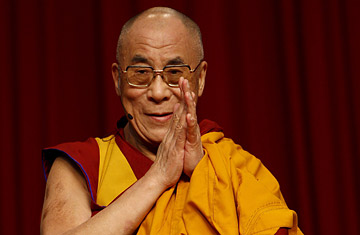
Tibetan spiritual leader the Dalai Lama
So, what's really happening in the talks between Beijing and the Dalai Lama's representatives in the city of Shenzhen?
In the old days, reporters in China were so tightly controlled in where they could go and whom they could talk to that they were often forced to scan the pages of the state media for subtle hints of change in official policy. Nowadays, under special rules enacted ahead of the Beijing Olympics, journalists are theoretically free to roam China and interview anyone. Except of course for Tibet and its bordering regions. Since the bloody anti-Chinese protests of March 10-16, reporters have once again been barred from Tibet and had to fall back on scanning the People's Daily and other government mouthpieces for hints of what is going on.
Monday yielded one clear clue when Chinese media carried stories on the meeting the previous day between representatives of the Dalai Lama and envoys from Beijing. Although the talks have been going on since 2002, this was the first time the Chinese public had heard about them, a sign for many analysts that Beijing was softening its previously hardline stance regarding the exiled Tibetan spiritual leader. It was also noted that President Hu Jintao had said he expected "positive results" from the talks, another first. Other analyses dwelled on the language used in the official media reports, some of which spoke of the "Dalai Lama group" rather than using phrases such as the "Dalai clique" or "splittist clique" that are usually employed.
According to official accounts, the two sides closed the day-long talks by agreeing to meet again for further talks at an unspecified date. That was seen as another good sign by some. But for all the positive signals, the impediments to real progress remain formidable, and pessimistic observers wondered whether Beijing's apparently more accommodating stance wasn't more motivated by a desire to regain some international credibility on the issue in the three months leading up to the Games. "Of course, we all want to believe that there could be some big changes and that China may take a more conciliatory approach," says one senior Western diplomat in the capital. "But you have to weigh against that the history of the past 30 years, in which Beijing has not moved one inch."
The Dalai Lama's stated aim is for Beijing to grant some kind of limited autonomy to Tibet. But achieving that aim — which would allow the 73-year-old to return home after nearly 50 years in exile — will take a tectonic shift in positions on both sides. One consistent condition made by negotiators for the Dalai Lama's Dharamsala-based government in exile, for example, has been that the new autonomous region would include so-called "greater" Tibet, that is, all the traditionally ethnic-Tibetan areas now parts of the provinces of Sichuan, Yunnan, Gansu and Qinghai. In total, that would compromise around a quarter of China's current territory. No government in Beijing could ever contemplate such a giveaway, which would almost certainly unleash a nationalist backlash of frightening proportions.
There are also other similarly fraught issues such as the presence — and future status — of large numbers of Han immigrants and the stationing of Chinese troops in the region, all of which would require very lengthy and complex talks to resolve.
And that's not even taking into account the impediments stopping progress on the Chinese side. First there is the problem of rhetoric: the more Beijing vilifies the Dalai Lama personally ("jackal in monk's robes" for example, or a man with a "human face but the heart of a beast"), the harder it will be to do an about-face and convince the Chinese people that he's actually somebody China can do business with.
Even more daunting, according to scholar Huang Jing, is the institutional resistance to change. Huang, currently a visiting fellow at the University of Singapore's East Asia Institute, says there is a huge bulwark of entrenched officials (in the United Front Work Department — a bureaucracy dealing with Tibetan matters — the Public Security Bureau, Foreign Affairs, the Religious Affairs department, the Communist Party in Tibet and the Minority Affairs Department) who have spent their lifetimes railing against "spilittism" and not only can't imagine any other approach but would fear losing their jobs under any new arrangement. Thus, Huang says, essentially the entire Chinese establishment that administers Tibet is totally opposed to a compromise solution.
Small wonder then that there are a few pessimists out there.
